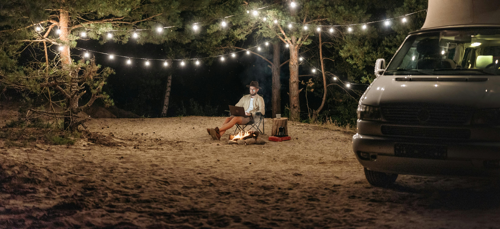5 Minutes with Simon Scholes
Mark caught up with Simon Scholes to understand how the new manufacturing facility project had evolved

Having successfully recruited three director level positions for VEKA UK’s extrusion plant in Burnley, Collingwood’s Head of Built Environment, Mark Goldsmith, was referred to the businesses recycling arm in 2018. With the business about to move to a new, state-of-the-art £11m manufacturing facility in Northamptonshire, the Managing Director, Simon Scholes, required an Operations Director to facilitate its move. In part, replicating existing sites for the group in German and France, the vision was to make this the most advanced uPVC window recycling plant globally.
18 months on, Mark caught up with Simon to understand how the project had evolved. Here’s what they discussed.
Mark: In setting the scene, can you explain the journey VEKA recycling has been on over the past two years Simon?
Simon: It has certainly been an interesting journey Mark. Moving an operational factory over 100 miles whilst maintaining business continuity to both our suppliers and customers was not without its challenges.
Our new location is better placed logistically for our supply chain. The move was a brave decision agreed unanimously by he board. It did mean however we sadly lost some experienced staff from our team. We had to start from scratch in Wellingborough and recruit across all disciplines of the business. We trained new staff and management in correct procedures whilst building the plant from scratch. During the crossover period and where possible used staff from our original factory to help train the new ones. Our staff in Kent worked right up to the closedown of the facility, a feat I believe showed their commitment to VEKA and one that gave us a good head start in our new home. Within 10 months of starting to install equipment we had a fully operational factory in Wellingborough, albeit with a new and inexperienced team. All credit to the new team and that 2019 (our first full year in just Wellingborough) showed that they learnt quickly and soon performed well above expected levels.
Mark: You certainly look less fraught than when I took the Ops Director brief a couple of years ago. From a managerial standpoint, what have been your main learning points to getting the new plant operational?
Simon: I was told once that the best way to build a successful business was to build a good team around you. I can certainly say that advice is very key to me possibly looking less fraught! We have had a few false starts but I am proud of the team we now have and the solid business we have built.
You have to let your managers manage. Of course, they will make mistakes and not do it ‘your way’ but you have to give them time and encouragement to be strong and grow in their roles. That is sometimes difficult to allow, especially when you are used to doing parts of their role – and possibly one is a bit of a control freak!
Communication is always key amongst the team. You have to be careful that it is not information overload but keep tasks clearly defined and live amongst the team and they can achieve great things. With good communication comes trust. The team have to rely on each other and trust the direction of travel. That doesn’t mean I still don’t have to take control sometimes, but I must say this is very rare as we all know our goals and we set out together to reach them. I believe we have built a collaborative and trustful working environment which fits perfectly with the VEKA family values.
I have tried to build a new VEKA family in Wellingborough. VEKA is a global PVC profile giant yet it is still family owned. Family values of trust, reliability & integrity are part of what our recycling plant should reflect. It’s not my company, I am a custodian of the VEKA brand. I should build something that is handed to the next custodian in a better condition than when I got it. I can’t do that on my own. I need a motivated, engaged, reliable and trustful team to work with to achieve our goals. We learn every day, and we will keep learning, growing and evolving – that’s what makes this such a great job.
Mark: And what have the main obstacles been in ensuring the site is up and running on time?
Simon: Well it certainly has not been the commitment from VEKA. VEKA AG in Germany pioneered with its investment into PVC recycling back in 1993, and they have not stopped since. Our plant in Wellingborough will be the newest part of that commitment in both engineering and financial terms. With our recycling plants in Germany and France as blueprints we have been able to evolve what works, using the latest technology in recycling. I am very excited to get to the finished article and see it all work!
Unforeseen bumps in the road have thrown us for six on occasion. We have had some poor contractors slow our progress, but we dug deep down and found solutions.
We didn’t have a complete blank canvas, so we have had to make some compromises due to the shape of the site and the designs of our buildings. We have adapted what we can and come up with some clever solutions where we can’t. Complications cost time and rarely speed things up!
Like so many businesses we were also affected greatly by the Covid-19 virus crisis. We took the difficult decision to protect our staff and close down the business by taking advantage of the governments’ job retention scheme. We will come back because we are strong and have not been reckless with our business. But we will come back carefully and thoughtfully and continue to observe social distancing measures to protect our staff that have made the business what it is.
Mark: What has been a surprising bottleneck and how did you overcome it?
Simon: It’s the balancing act between installation of a new facility whist running an operational factory on the same site – sometimes in close proximity to each other. This makes for logistical problems more often than you would like. To install some new equipment sometimes machinery needs to be switched off or de-installed meaning you cannot process. With more than 1000t a month of bulky PVC windows moving in and out of our site, to lose use of just one machine for a few days causes us huge space and storage issues.
During the build this has had to happen on numerous occasions over the past 2 years. We overcame it each time with careful planning, working with our customers so we do not affect their businesses and as always, an amazing team effort with everyone pulling together.
Mark: So, what is the overall vision for the site once it is fully up and running in terms of tonnage output, regions and the markets you will provide pellets to?
Simon: VEKA Recycling & VEKA Compounds provide very different solutions to their markets. VEKA Recycling offers a reliable and sustainable service to window makers and waste firms and ensures the nations PVC windows are recycled correctly and safely.
VEKA Compounds offers reliable, sustainable and quality compounded pellets to the PVC profile extrusion industry. We supply material to make not only new window profile but all manner of building and ancillary products.
I don’t want us to chase the tonnage or output. This is a marathon, not a sprint and we need to be mindful of building a strong vibrant long-term business, not a flash in the pan.
My vision is that we have a profitable company that sets the gold standard for our industry. A business that has an engaged, well trained and motivated workforce that are proud of where they work.
We are UK based and look to supply the UK markets with our finished products. With the increased expectation from the UK window industry regarding recycled PVC content there is growth domestically we have yet to realise. But if the market is full and we can sell no more than it's a big world out there and who knows what the future will bring?
Mark: Walking around the FIT Show last year there was a good amount of noise around sustainability of products manufacturers were offering. Aside from VEKA UK’s manufacturing plant in Burnley, how do you view the market’s appetite for purchasing recycled pellets as part of their manufacturing process?
Simon: It is becoming more and more the normal to include recycled material in new products. Also, the acceptance of recycled material being a quality product is more widespread that it used to be.
I would like to hope that what we and others in our market, are producing each day becomes the new normal. That recycled polymer (not just PVC but also other plastics) is expected, not a novelty.
I work with the British Plastics Federation as well as many organisations across Europe to push the positive messages regarding thoughtful design, with whole life cycle and recycling in mind, when planning new products. Recycled plastics are a fantastic resource and we should all see the value in them and their place, very firmly, as an integral part of new plastic products.
About the author
With 25 years of recruitment experience under his belt, Mark has spent the last 21 focused on Building Products & Construction.
Read more >



